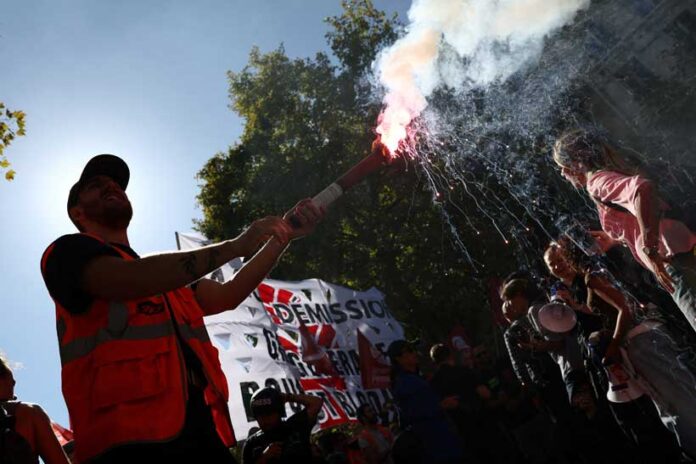NEWS BRIEF
Hundreds of thousands of French workers, students, and union members staged nationwide strikes and protests on Thursday, demanding the reversal of austerity-driven budget cuts and pension reforms while challenging President Macron’s new Prime Minister Sebastien Lecornu to abandon fiscal tightening. The demonstrations, which disrupted schools, transport, and city centers, underscore deepening public anger over economic inequality and austerity measures as the government struggles to address France’s budget deficit and political fragmentation.
WHAT HAPPENED
- Hundreds of thousands participated in strikes and protests across France, with unions reporting 400,000 attendees by midday and expectations of up to 800,000 nationwide.
- Teachers, train drivers, hospital staff, and students walked out, blocking high schools and slowing traffic, while clashes erupted in cities like Nantes and Lyon, leading to tear gas deployment and arrests.
- Unions demanded the cancellation of planned €44 billion budget cuts, higher taxes on the wealthy, and reversal of Macron’s unpopular pension reform extending working years.
- New Prime Minister Sebastien Lecornu faces dual pressure from street protests and investor concerns over France’s deficit, which reached nearly double the EU’s 3% limit in 2023.
WHY IT MATTERS
- The protests reflect widespread rejection of austerity politics and highlight simmering discontent over rising living costs, eroding public services, and perceived economic injustice.
- Lecornu’s ability to govern is constrained by a fractured parliament lacking a majority, forcing reliance on opposition support for budget passage amid social unrest.
- France’s fiscal challenges mirror broader European tensions between deficit reduction mandates and public demand for welfare protection and progressive taxation.
- The mobilization signals renewed union strength and strategic alignment with youth movements, potentially shaping Macron’s policy flexibility ahead of elections.
IMPLICATIONS
- Lecornu may be forced to moderate budget cuts or seek left-wing support, risking alien centrist allies and investors demanding fiscal discipline.
- Sustained protests could escalate into broader anti-government movements, reminiscent of the 2023 pension reform strikes or Yellow Vest demonstrations.
- The EU may exert pressure on France to comply with deficit rules, potentially triggering austerity enforcement despite domestic opposition.
- Political instability may deter investment and exacerbate economic uncertainty, affecting Macron’s reform agenda and France’s influence within the EU.
This briefing is based on information from Reuters.


